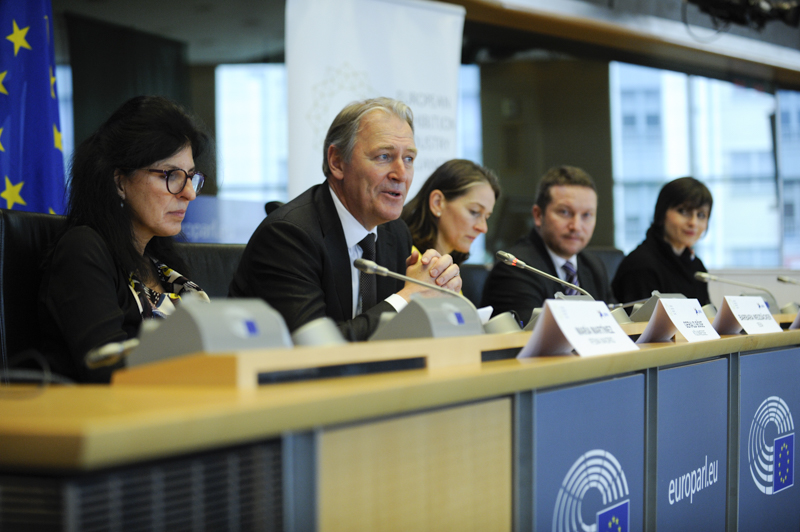
The European Exhibition Industry Alliance is a cooperation between the European Members of the Global Association of the Exhibition Industry UFI and the Members of the European Major Exhibition Centres Association EMECA.
It represents the common interests of the European exhibition industry towards the European Union Institutions and other relevant stakeholders in Brussels. It promotes the impact of the sector, monitors EU issues and advocates the sector’s common interests in order to maintain a favourable operating environment within the EU and globally.
The European Exhibition Industry Alliance is based in Brussels and run by the Secretary General Barbara Weizsäcker.
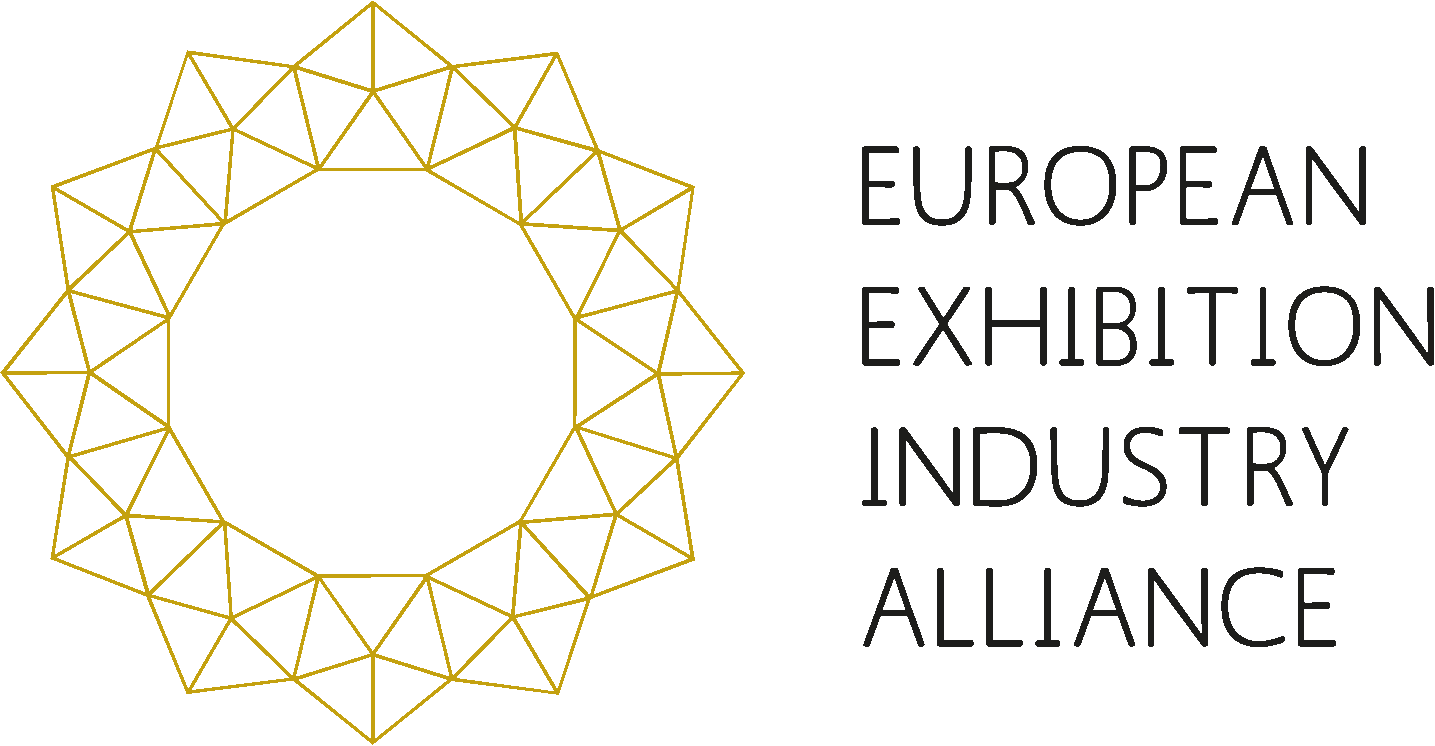
PARTNERS
IPR HELPDESKS, EUIPO & WIPO
Intellectual Property (IP) and Intellectual Property Rights (IPR) are key to innovation and competitiveness in Europe. EMECA Members actively support the promotion and awareness raising of IPR and IPR conflict solving during trade fairs.
The European Exhibition Industry Alliance (EEIA), composed of EMECA and UFI, cooperates with the European Union Intellectual Property Office (EUIPO), the EU-funded IPR Helpdesks and the World Intellectual Property Organisation (WIPO) in this respect and offers tailor made info material for trade fair organisers and exhibitors.
Intellectual property management at trade fairs
Tackling intellectual property (IP) issues in trade fairs and exhibitions is not only a crucial element for exhibitors. It is also highly important for organisers as the risk of IP infringement in a trade fair/exhibition may affect the credibility of the trade show and might discourage companies from participating in these events. Being aware of this, many organisers are taking initiatives to ease the fight against IP infringements.
This fact sheet offers some possible measures that can be taken by the trade fair organisers to prevent the infringement of IP rights during trade fairs, and introduces real examples from a number of trade fair organisers and associations.
Trade fairs and exhibitions are very important marketing tools for companies, in particular for SMEs. They help to attract new customers, test products, access new markets, raise the image, profile and popularity of a company or product, and enhance competitiveness.
While, trade fairs can facilitate intellectual property (IP) infringements, they can also help IP owners detect such infringements. Therefore, exhibitors must be aware of all the IP issues that can arise in the context of trade fairs and take appropriate measures before, during and after the show.
IP considerations for trade fair organisers
Tackling intellectual property (IP) issues in trade fairs and exhibitions is not only a crucial element for exhibitors. It is also highly important for organisers as the risk of IP infringement in a trade fair/exhibition may affect the credibility of the trade show and might discourage companies from participating in these events. Being aware of this, many organisers are now taking initiatives to ease the fight against IP infringements.
This fact sheet offers some possible measures that can be taken by the trade fair organisers to prevent the infringement of IP rights during trade fairs, and introduces real examples from a number of trade fair organisers and associations.
Intellectual Property Helpdesk (europa.eu)
WIPO - World Intellectual Property Organization
Watch our latest Webinar on How to protect your Intellectual Propery Rights at trade fairs internationally? co-organised by IP Helpdesk and EEIA.
Get free information and support on your Intellectual Property issues and apply for the European Union Intellectual Property Office's SME Fund.
Download our brand new leaflets on IPR protection:
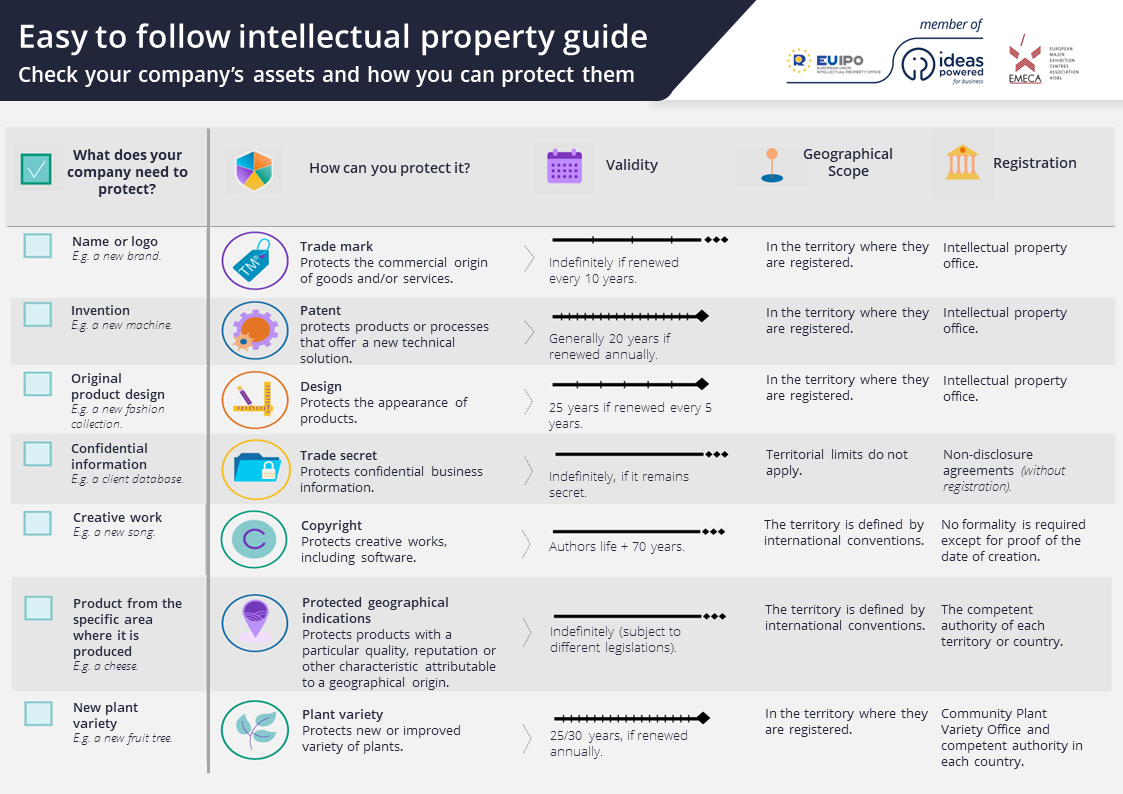
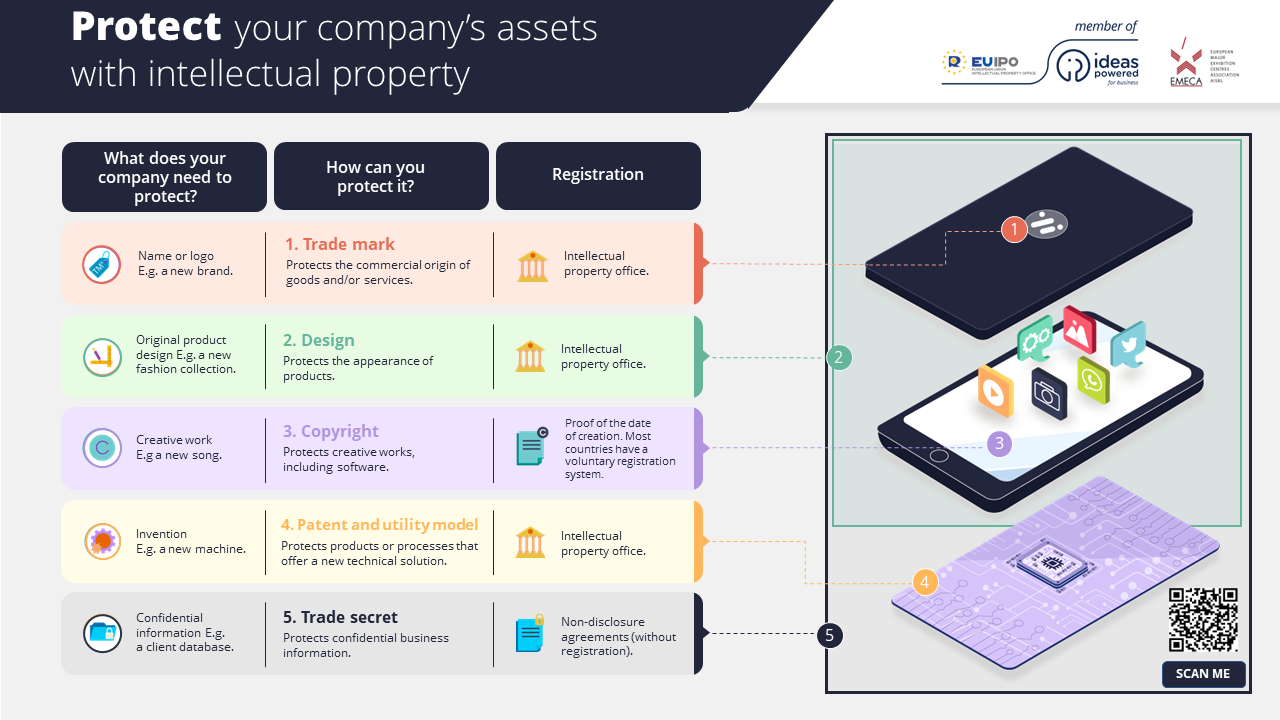

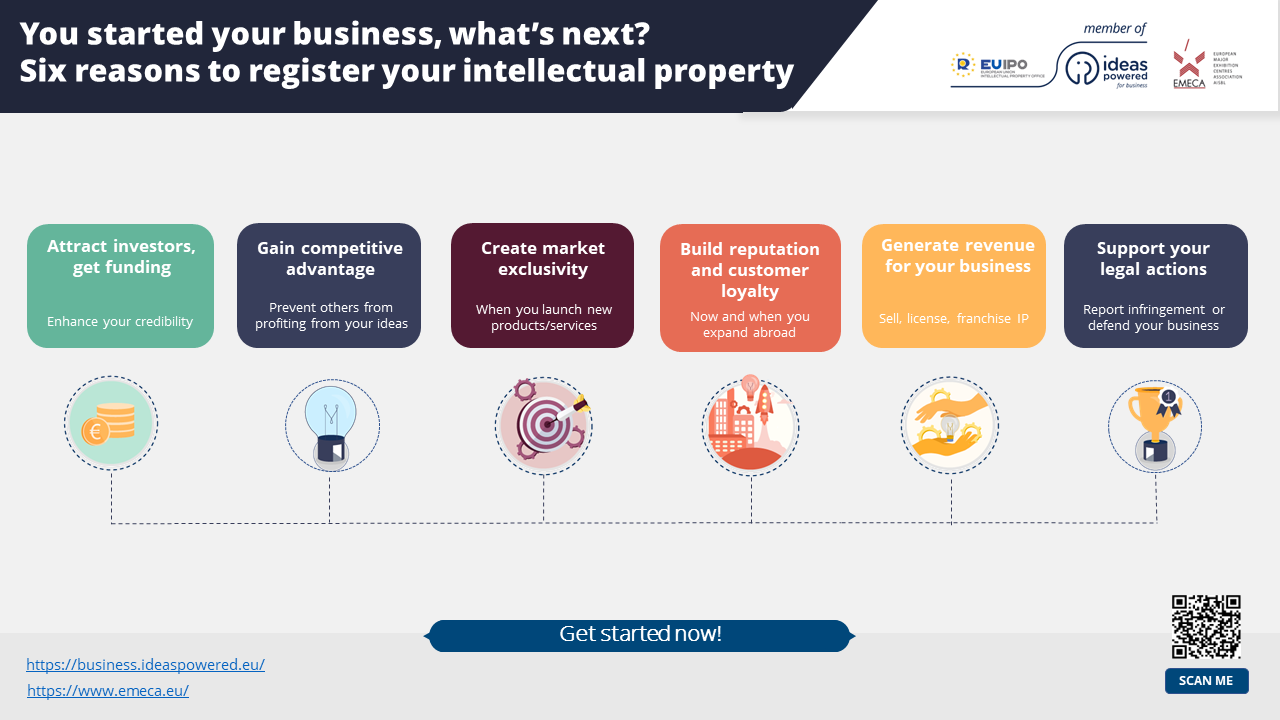
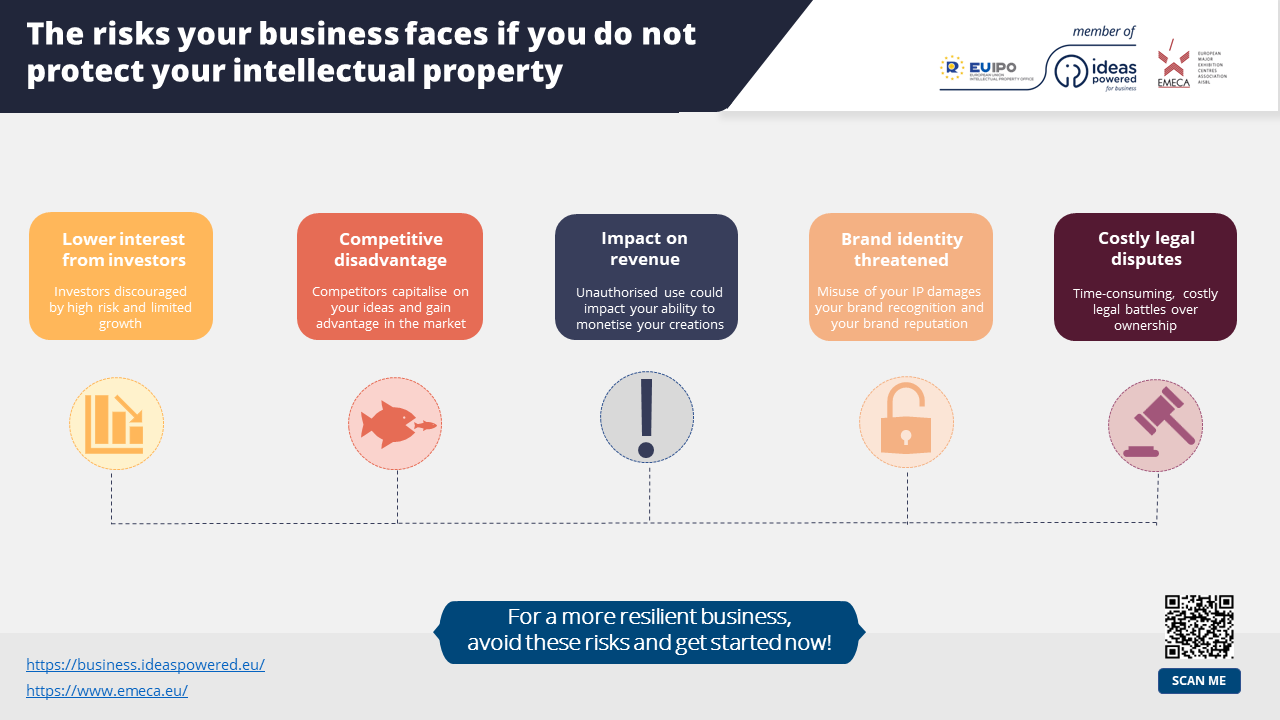
About the European Union Intellectual Property Office (EUIPO)
The European Union Intellectual Property Office (EUIPO) is an agency of the European Union, responsible for managing the EU trade mark and design (RCD). The EUIPO aims to improve SMEs' understanding of and access to intellectual property (IP) through free personalised IP support and initiatives such as IP Scan, the SME Fund and Easy Filing.
EMECA is a member of the Ideas Powered for business network, which the European Union Intellectual Property Office (EUIPO)
manages. The network aims to empower EU SMEs by helping them access centralised, clear, relevant and reliable information
during theirbusiness journey. It also promotes the importance of intellectual property (IP) rights in protecting and enforcing their
competitive advantage.
Find out more on the EUIPO’s dedicated web page and the Ideas Powered for business website.
Follow us on our LinkedIn and Twitter pages to keep up to date with EU funding and support initiatives as well as IP events for SMEs.


ENTERPRISE EUROPE NETWORK
The European Exhibition Industry Alliance (EEIA), composed of EMECA and UFI, is part of the European Commission's "Friends of EEN" (Enterprise Europe Network).
The Enterprise Europe Network helps businesses innovate and grow on an international scale. It is the world’s largest support network for small and medium-sized enterprises (SMEs) with international ambitions.
The Network is active in more than 60 countries in Europe and worldwide. It brings together 3,000 experts from more than 600 member organisations – all renowned for their excellence in business support. They include technology poles, innovation support organisations, universities and research institutes, regional development organisations and chambers of commerce and industry.
EMECA is a natural partner of the Enterprise Europe Network. The EEN's activities are complementary to EMECA Members' initiatives and often are being implemented at trade fairs.
JOINT INDUSTRY MEETINGS COUNCIL
EMECA is a member of the Joint Meetings Industry Council (JMIC) that represents the combined interests of major international Business Meetings Industry associations. It has provided a forum for information exchange, strategy development and the recognition of excellence amongst industry groups for well over 50 years and is currently focussing on documenting and communicating the diverse values of the industry to broader community and governmental audiences in order to generate greater appreciation for its diverse roles in supporting global economic, academic, professional and social development.
JMIC hosts the largest global community initiative on decarbonisation of the exhibition and meetings industy, Net Zero Carbon Events (NZCE). EMECA is gold sponsor for NZCE.
EMECA Secretary General Barbara Weizsäcker is elected JMIC Board Member Treasurer.
https://www.themeetingsindustry.org/
https://www.netzerocarbonevents.org/
NET ZERO CARBON EVENTS
In order to master the transition to carbon neutral and finally to net zero carbon events, EMECA is signatory of the global Net Zero Carbon Events initiative.
Net Zero Carbon Events is an industry initiative to address climate change, hosted by the Joint Meetings Industry Council (JMIC). It aims to bring together a wide range of industry stakeholders to:
- Jointly communicate the industry’s commitment to tackling climate change and driving towards net zero by 2050
- Develop common methodologies for measuring the industry’s direct, indirect and supply chain greenhouse gas emissions
- Construct an industry-wide roadmap towards net zero by 2050, and emissions reductions by 2030 in line with the Paris Agreement, with support and guidance on key issues
- Foster collaboration with suppliers and customers to ensure alignment and common approaches
- Establish common mechanisms for reporting progress and sharing best practice

PROJECTS
The EU Business Hub - Japan and the Republic of Korea is an EU-funded programme that supports EU Small and Medium-sized Enterprises (SMEs) and start-ups in the green, digital, and healthcare sectors to enter the markets of Japan and the Republic of Korea. It aims to strengthen EU businesses' export and investment activities and to foster more resilient, sustainable, and technologically advanced value chains with both markets. 10 business missions to Japan and 10 to the Republic of Korea to leading trade fairs will be organised over the next four years. Each business mission will allow a group of 50 cutting-edge companies to benefit from extensive and tailored business coaching and logistical support throughout their participation.
The European Exhibition Industry Alliance is one of the partners of the project, working to expand the reach of the initiative and maximise the impact of the missions to EU companies.
Discover more on the official website: www.eubusinesshub.eu


EEIA has been part of the EIC Overseas Trade Fairs 2.0 Programme (OTF 2.0)
OTF 2.0 supports European Innovation Council's beneficiaries to promote their commercialisation strategy in foreign markets and leverage business opportunities at the most popular trade fairs, strengthening the EU innovation brand around the world. Selected EIC-funded SMEs, startups and scale-ups from EU Member States and associated countries will have access to the programme.
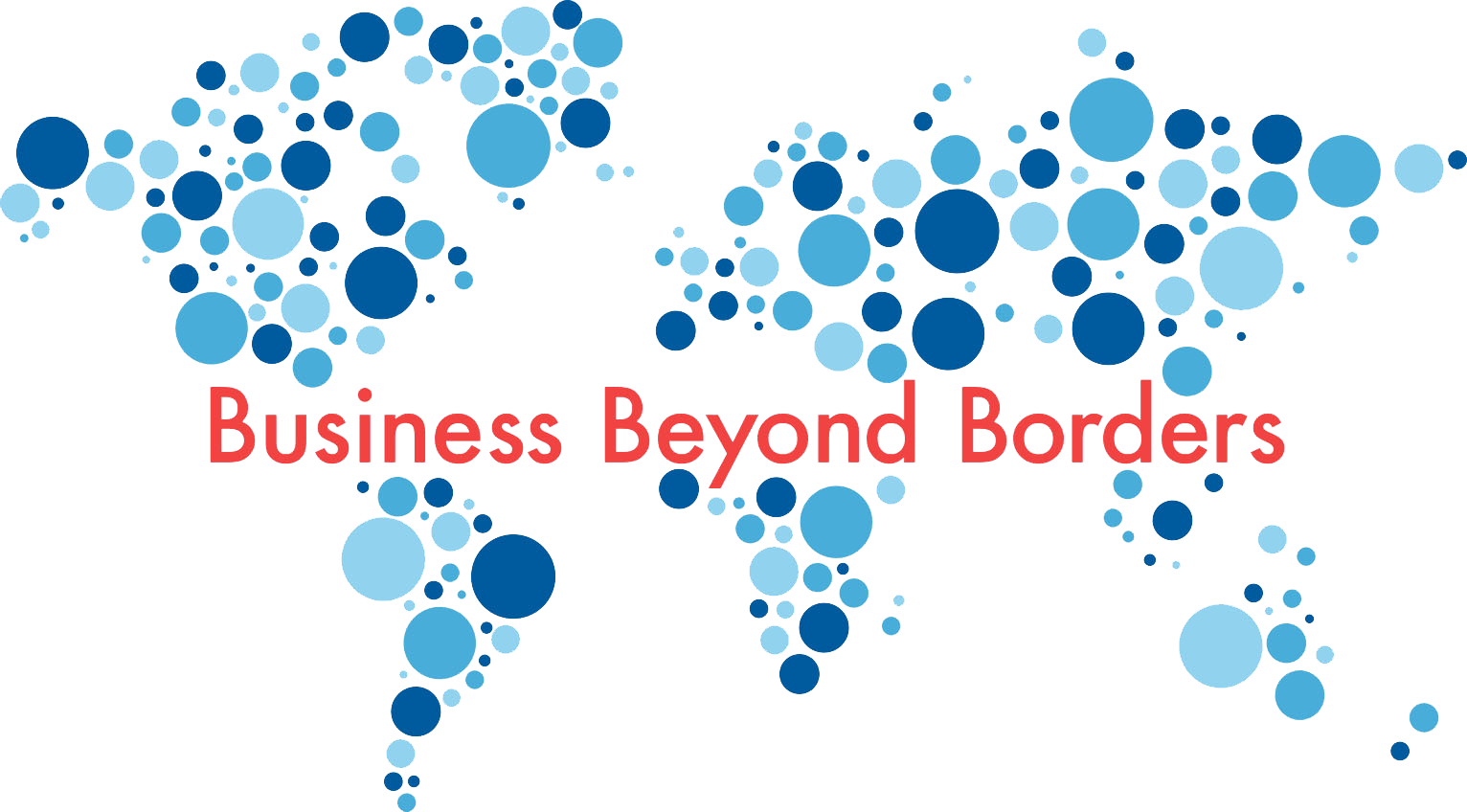
Business Beyond Borders was a European Commission initiative to help European businesses, in particular Small and Medium Sized Enterprises (SMEs) and Clusters, to operate internationally. Business Beyond Borders organised a series of matchmaking events at leading international trade fairs to bring together SMEs and relevant Cluster representatives with potential trading partners from Europe and abroad with the aim of assisting European companies moving into new international markets.
10 international trade fairs offered this service:
2017
Genera, Madrid, Spain
African Utility Week, Johannesburg, South Africa
Texworld, Paris France
HOST, Milan, Italy
Trustech, Cannes, France
2018
Renewable Energy India, Greater Noida
FIDAE, Santiago de Chile, Chile
AMB, Teheran, Iran
Cebit Australia, Sydney, Australia
Vision, Stuttgart, Germany
Eurochambres, EMECA, UFI and LOW formed a consortium to implement this Commission initiative from 2016-2019.
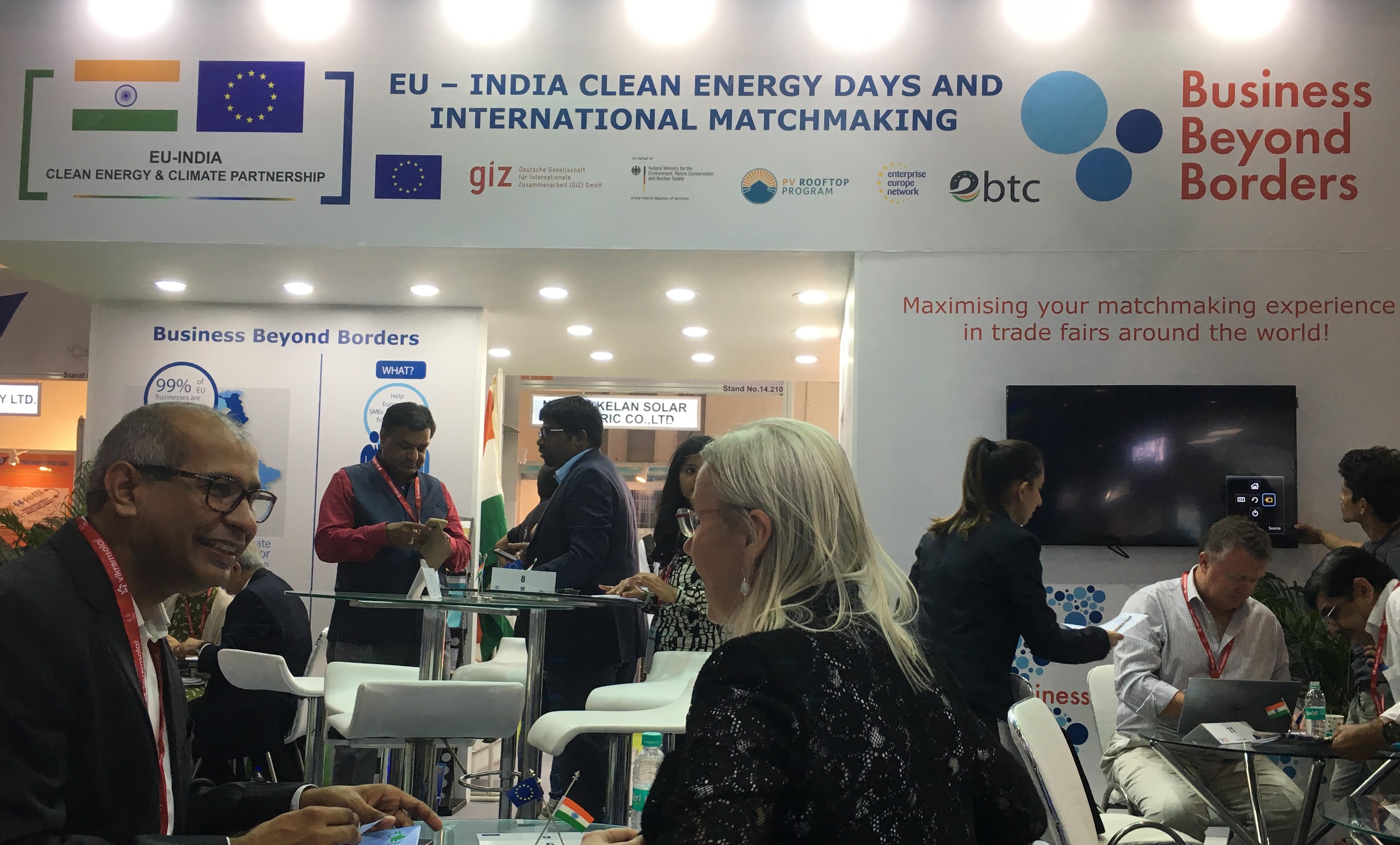
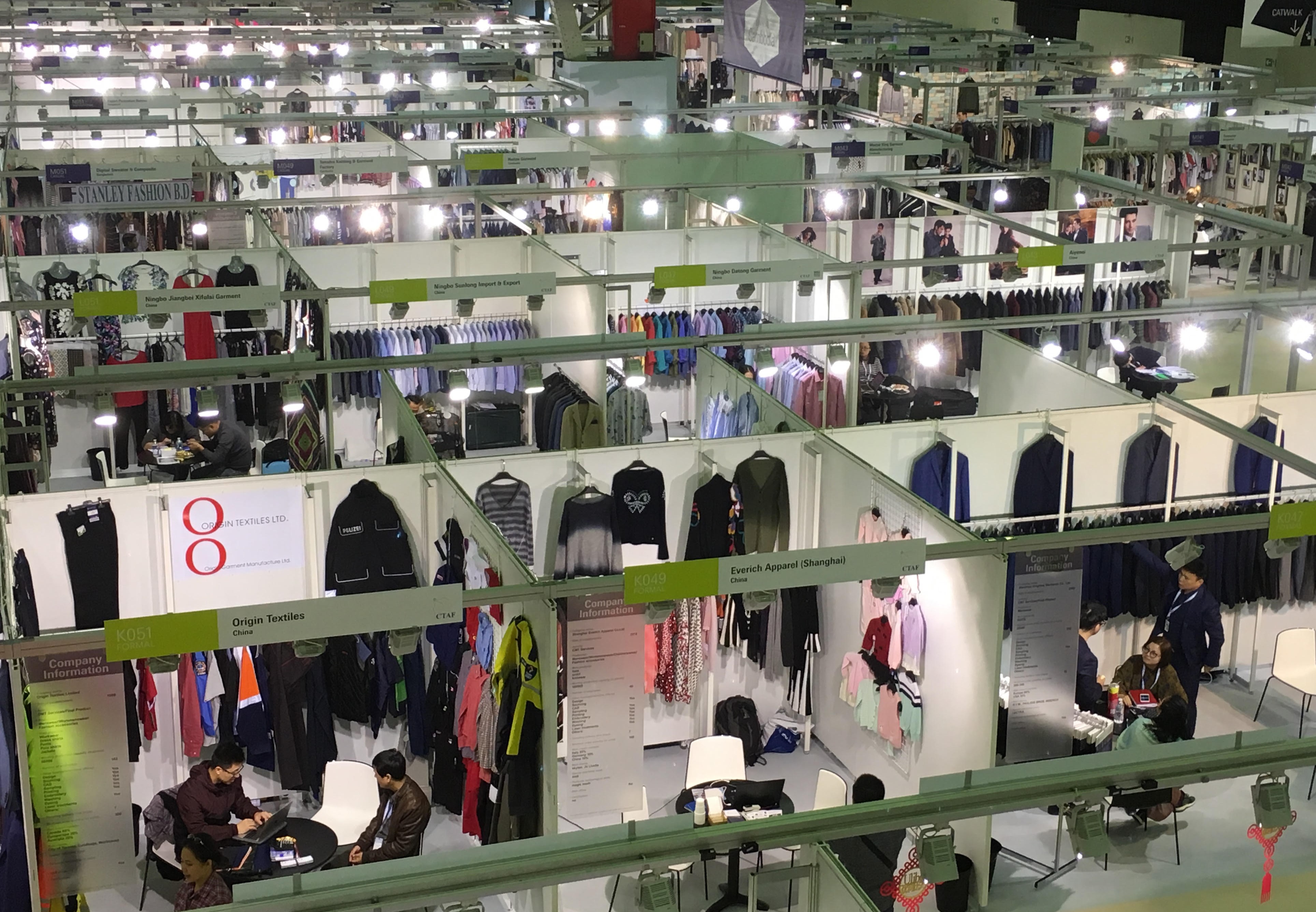
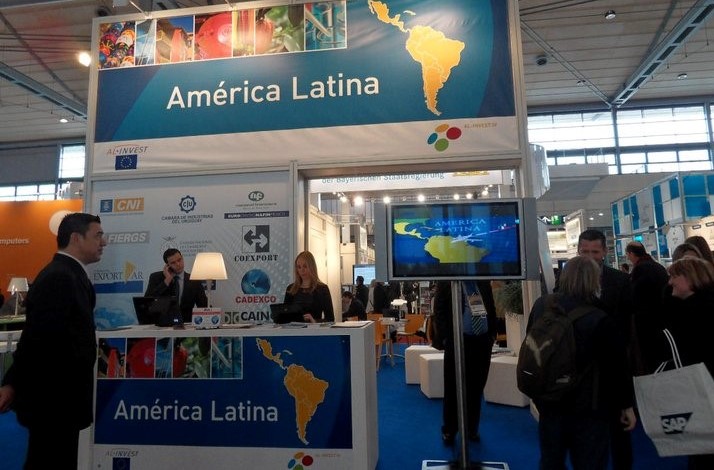
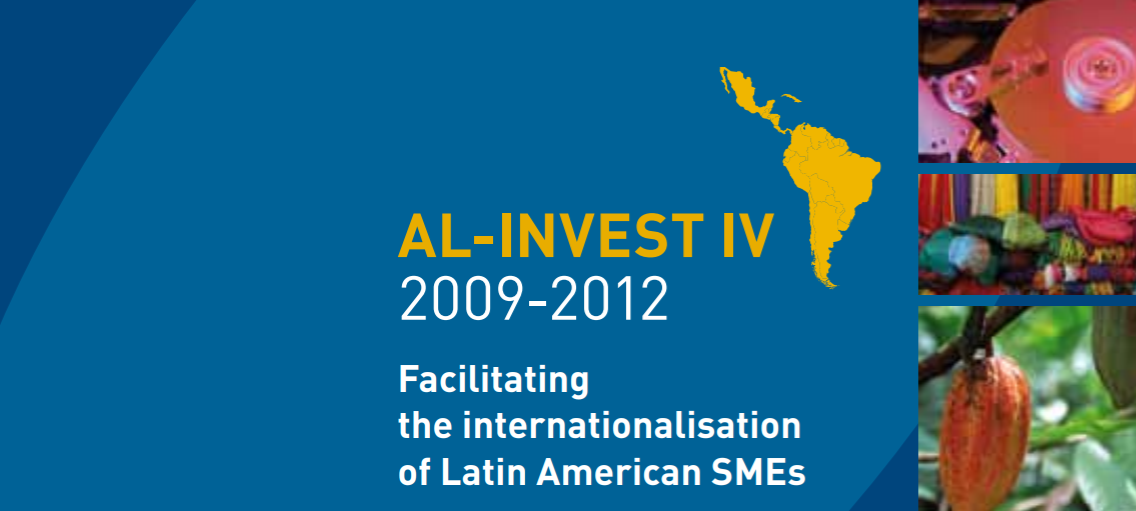

The AL-INVEST program is one of the most important international cooperation programs from the European Commission in Latin America. It began in 1994 seeking to bring European investment to Latin America and with time, seeing the realities that were found in the region, it changed to promote internationalization and to promote and encourage productivity in thousands of micro-small and medium-size companies (MSME´s) in Latin America.
EMECA participated in the fourth phase of this programme from 2009 to 2013 as a member of the European Services Consortium, together with leader Eurochambres, GIZ and other partners. Among other services, AL-Invest enabled small and medium enterprises (SMEs) from Latin America to exhibit at major European exhibitions. The total investment of AL-Invest IV was 62 million euros, of which 50 million euros was funded direct by the European Commission. More than 87,000 SMEs from Latin America have taken part in AL-Invest IV activities.
You can download the AL-Invest leaflet here
The fifth phase of this program, AL-INVEST 5.0, started in 2015: integrating growth for social cohesion in Latin America. A consortium of 11 international organizations that are coordinated by the Santa Cruz Chamber of Commerce Industry Services and Tourism of Santa Cruz Bolivia (CAINCO) executed the project across Latin America.
POSITIONS
INTELLECTUAL PROPERTY RIGHTS - IPR
EMECA supports awareness raising of the value and importance of Intellectual Property Rights and intangible assets for companies, especially SMEs. Furtermore, many EMECA members offer support to conflict resolution and actively encourage the enforcement of IPR during trade fairs.
Appropriate protection of IP is key to the success of many companies. Large international trade fairs offer an easy and free of charge certificate to prove that a product had been displayed at an exhibition. This Priority Certifictate can later be used to register a design with the national authority. EMECA advocates for the recognition of this Priority Certificate also by EUIPO, the European Union Intellectual Property Office, in the current review process of the Design Regulation.
